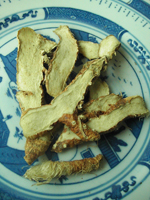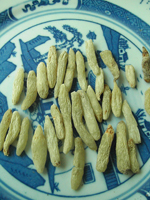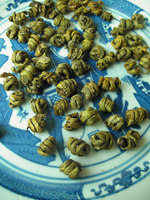|
During menopause, temporary hormonal disturbances usually lead to unsettled cardiovascular and neural functioning. Disorders in neural-vascular control result in hot flashes, skin redness, sweating, palpitations and dizziness. These distressing symptoms are mostly caused by hormonal fluctuation; the hypothalamus and pituitary are attempting to get the ovaries to produce more hormones as well as to ovulate. Typically, a sudden, mild-to-intense hot feeling surges up to the face and upper body, and sometimes may spread throughout the whole body. These hot "flashes" are usually accompanied by a flushed face and sweating followed by chills. The episodes can vary in frequency and duration, each time may last from 30 seconds to 5 minutes, and may appear several times a day or just a few times per week. During episodes, individuals can also suffer from palpitations, headache, anxiety, faintness, weakness and a suffocated feeling. According to records, about 20% of hot flashes occur at the peri-menopause stage, while 80% occur in the post-menopause stage; various activities, diet and mood changes usually trigger the hot flashes or make them worse. When hot flashes appear at night, they can lead to sleeping difficulties which leads to difficulty in concentrating, poor memory, irritability and tiredness during the day.
When hot flashes or sweating are the major complaints, TCM regards these as internal damage problems due to such things as blood and qi deficiency, kidney yin deficiency, spleen and heart deficiency, phlegm stagnation, heat or phlegm irritating heart. Some of the common disharmony patterns are:
- Yin deficiency creating virtual fire: hot flashes, a red face, sweating, hot sensations in the palms and soles, dizziness, ear ringing, palpitations, insomnia, lumbar soreness, knee weakness, red tongue, and a taut, thready and rapid pulse.
- Deficiency of yin and yang: hot flashes, fatigue, depression, limb coldness and numbness, occasional low fever in the afternoon, palpitations, insomnia, night sweats, mouth dryness, pale tongue, and deep thready pulse.
- Exhaustion of qi and yin: flushed cheeks, low fever in the afternoon, shortness of breath, a chilled feeling, excessive sweating or night sweats, poor appetite, fatigue, paleness, loose bowels, pale tongue with indented margin, and weak pulse.
- Deficiency of heart and spleen: hot flashes, dizziness, blurred vision, insomnia, panic attacks, fatigue, depression, paleness, shortness of breath, pale tongue, and thready pulse.
 |
|
 |
|
 |
Anemarrhena rhizome |
|
Dwarf lily-turf tuber |
|
Dendrobium |
|